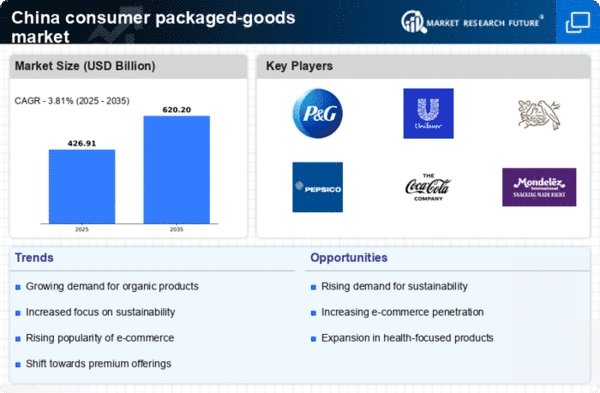Rising Disposable Income
The increase in disposable income among Chinese consumers is a significant driver for the consumer packaged-goods market. As the middle class expands, consumers are willing to spend more on premium products, leading to a shift in purchasing patterns. Reports suggest that the average disposable income in urban areas has risen by over 8% annually, allowing consumers to explore higher-quality and branded goods. This trend is particularly evident in categories such as organic foods and health supplements, where consumers are increasingly prioritizing quality over price. Consequently, brands that position themselves as premium options are likely to benefit from this growing consumer willingness to invest in better products within the consumer packaged-goods market.
Innovation in Product Offerings
Innovation plays a crucial role in driving growth within the consumer packaged-goods market. In China, companies are increasingly focusing on developing new flavors, packaging designs, and health-oriented products to meet evolving consumer preferences. The introduction of plant-based alternatives and functional foods has gained traction, reflecting a shift towards healthier eating habits. Market data indicates that innovative products can achieve up to 30% higher sales compared to traditional offerings. This emphasis on innovation not only attracts new customers but also retains existing ones, as consumers seek variety and novelty in their purchases. Therefore, brands that prioritize research and development are likely to succeed in the competitive landscape of the consumer packaged-goods market.
Regulatory Changes and Compliance
Regulatory changes in China are shaping the landscape of the consumer packaged-goods market. The government has implemented stricter food safety and labeling regulations, which compel companies to enhance transparency and quality control. Compliance with these regulations is essential for maintaining consumer trust and avoiding penalties. Recent legislation has focused on reducing food additives and improving nutritional labeling, which aligns with the growing consumer demand for healthier options. Companies that proactively adapt to these regulatory changes not only ensure compliance but also position themselves favorably in the eyes of health-conscious consumers. Thus, navigating the regulatory environment effectively is a critical driver for success in the consumer packaged-goods market.
Urbanization and Changing Lifestyles
The rapid urbanization in China is reshaping consumer behavior, significantly impacting the consumer packaged-goods market. As more individuals migrate to urban areas, their lifestyles evolve, leading to increased demand for convenience-oriented products. Urban consumers often seek ready-to-eat meals and packaged snacks, which are perceived as time-saving solutions. This shift is reflected in the market, where convenience foods have seen a growth rate of approximately 15% annually. Additionally, the rise of dual-income households contributes to this trend, as busy professionals prioritize efficiency in their shopping habits. Consequently, brands that adapt to changing lifestyles by offering innovative and convenient products are likely to thrive in the consumer packaged-goods market.
Digital Marketing and Social Media Influence
Digital marketing and social media profoundly influence consumer purchasing decisions in China, particularly within the consumer packaged-goods market. With over 900 million internet users, brands leverage platforms like WeChat and Douyin to engage consumers directly. This digital engagement fosters brand loyalty and drives impulse purchases, as consumers are often swayed by online reviews and endorsements. Recent data indicates that approximately 70% of consumers in urban areas rely on social media for product recommendations. As a result, companies that effectively utilize digital marketing strategies are likely to capture a larger share of the consumer packaged-goods market, appealing to tech-savvy consumers who prioritize online interactions.
















